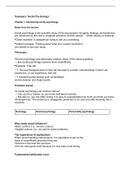Summary
Summary and lecture notes Social Psychology (Tilburg University)
- Course
- Institution
- Book
This summary covers all exam materials (book and lectures) to pass the course Social Psychology at Tilburg University. I passed the course with an 8 so hopefully this summary helps you to pass the course as well!
[Show more]



